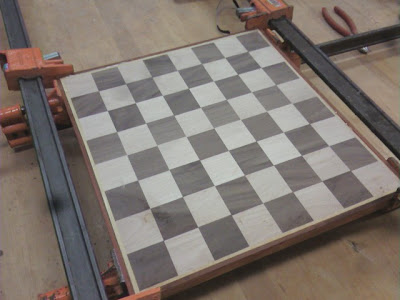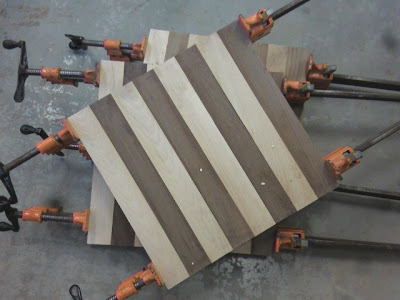Thursday, November 19, 2009
Rejected Delivery: Not Everyone Gets an A+ in Shop
It was a real life experience for the students to see their teacher reject the work of a delivery man and the lumber company. I guess after all is said and done, not everyone gets an A+ in shop.
Mr. Wiemers
http://mrwiemersshop.com
Wednesday, November 18, 2009
Chess Board Production (part two)

 The walnut/birch chess board with initial trim of Yellow Heart from Brazil and Paduak from West Africa.
The walnut/birch chess board with initial trim of Yellow Heart from Brazil and Paduak from West Africa.The chess board clamping in clamps attaching the Paduak wood trim.
Mr. Wiemers
http://mrwiemersshop.com
Monday, November 16, 2009
Chess Board Production
 Two inch strips of walnut and birch.
Two inch strips of walnut and birch.
Glue together.

Cut across grain. Flip every other one over.


Glue and clamp to make the chess board.

Chess pieces turned on a CNC lathe in the shop.
Trimming the chess board with 18" strips of Yellow Heart wood from Brazil
Cutting strips of Paduak from West Africa to trim the chess board

Thursday, October 29, 2009
Monday, October 19, 2009
Thursday, October 15, 2009
Ten Tips for Writing a Blog
These tips taken from Mr. McClung's post at this link. I found this very useful for a variety of reasons. Mr. McClung is doing this as a class project. I will use this for my own students who are blogging, but also personally and at school.
1. Make your opinion known
People like blogs, they like blogs because they are written by people and not corporations. People want to know what people think, crazy as it sounds they want to know what you think. Tell them exactly what you think using the least amount of words possible.
2. Link like crazy.
Support your post with links to other web pages that are contextual to your post.
3. Write Less
Give the maximum amount of information with the least amount of words. Time is finite and people are infinitely busy. Blast your knowledge into the reader at the speed of sound.
4. 250 is enough
A long post is easier to forget and harder to get into. A short post is the opposite.
5. Make Headlines snappy
Contain your whole argument in your headline. Check out National newspapers to see how they do it.
6. Include bullet point lists
We all love lists, it structures the info in an easily digestible format.
7. Make your posts easy to scan
Every few paragraphs insert a sub heading. Make sentences and headlines short and to the point.
8. Be consistent with your style
People like to know what to expect, once you have settled on a style for your audience stick to it.
9. Litter the post with Keywords.
Think about what keywords people would use to search for your post and include them in the body text and headers. make sure the keyword placement is natural and does not seem out of place.
10. Edit your post
Good writing is in the editing. Before you hit the submit button, re-read your post and cut out the stuff that you don’t need.
Mr. Wiemers
http://mrwiemersshop.com
Wednesday, October 14, 2009
Tuesday, October 13, 2009
Luke's Half-Pipe

When Luke came into the shop as a sixth grader he asked several times if he could ever build a small half-pipe for his tech-decks. Today Luke and I put one together quick for him before his seventh grade year comes to a close this week.
Mr. Wiemers
http://mrwiemersshop.com
7th Grade Shop Video
Mr. Wiemers
http://mrwiemersshop.com
Monday, October 12, 2009
First Quarter of Seventh Grade Shop
We are putting together a video of these modules and will post it later.
Mr. Wiemers
http://mrwiemersshop.com
Friday, October 9, 2009
"Pop-the-Balloon-on-the-Pin-in-the-Hat" Game
Mr. Wiemers
http://mrwiemersshop.com
Thursday, October 8, 2009
Links to 1st Qt. 7th Grade Shop
Seventh Grade Student Videos processed and uploaded to schooltube from the first quarter:
http://www.schooltube.com/videosearch.php?q=dcgms7
Seventh Grade Student Blogs from the first quarter:
http://7thshop.blogspot.com/
Seventh Grade Student Podcasts from the first quarter:
http://web.mac.com/wiemers/Site/Podcast/Podcast.html
Here are some videos that I have posted on schooltube:
http://www.schooltube.com/videosearch.php?q=wiemers
Mrs. Phillips' Principal Blog "Life in the Middle":
http://lphillipsdcg.blogspot.com/
Mr. Wiemers
http://mrwiemersshop.com
Sunday, August 30, 2009
A Leader
A LeaderMr. Wiemers
There are life lessons
that you really need.
Things you must know
in order to lead.
Learn to listen
so that others will listen to you.
Learn to speak
so that others might speak to you.
Learn to love
so that someone might love you.
Learn to die
so others will die along side you.
Learn to forgive
so others will forgive you.
Learn to please
so others will try to please you.
Learn to follow
so boys will follow you.
Learn to be teachable
so you will be able to teach.
Learn to laugh
so people will laugh with you.
Learn to work
so they will work for you.
Learn to live
so people can live with you.
You can't show what you can't do.
You can't teach what you don't know.
So learn to learn
so these men can learn from you.
- Zac Wiemers, Junior, age 16
http://mrwiemersshop.com
Saturday, August 29, 2009
"Education Week"
Ben Franklin, writing as Poor Richard, declared: 'A learned blockhead is a greater blockhead than an ignorant one.' His Autobiography basically argued that he had become a great American, scientist, and political thinker by spending less time in school, not more.Wolff then comments what would be lost if our students were forced to spend longer days in school: time with parents working two jobs, responsibility and money from after school jobs, time spent supervising siblings, relaxation, time to do homework. I could add many things more that would be lost with a longer school day. I would suggest reducing the things we try to cram into a school day before we make the school day longer. But, that was not the point of this article.
Abraham Lincoln read Franklin, and when he ran for office made sure to portray himself as a largely uneducated backwoodsman. Henry Ford believed too much schooling could ruin a mind. And John F. Kennedy, for all his presidential rhetoric about the importance of education, thought his time in prep schools and then Harvard mostly silly: The socializing was fun, the learning of little to no consequence."
Wolff ends with suggesting a more flexible, alternative solution. A school building, he says, is a major community resource with computers, cafeterias, libraries and sport facilities. "Why not institute a program that transforms our public schools into community centers?" They could be a place for students to do their evening research and homework. I would ask, why are school libraries and school computer labs shut down after school? Why aren't night classes added to assist students who need more help. I say we should reduce the socialistic load placed on schools during the day, restore the vision of education and, instead of lengthening the school day, simply extend the hours the school is opened and equip with man power to teach and assist in the learning process. Men like Franklin, Ford, Lincoln and Kennedy realized that school does not have a monopoly on education. If schools continue to think they have a monopoly on education and that they control the educational process they will continue to deteriorate as an educational institution.
Mr. Wiemers
http://mrwiemersshop.com
New Blog for 7th Grade Students
http://7thshop.blogspot.com/
Mr. Wiemers
http://mrwiemersshop.com
Friday, August 28, 2009
i-Movie and Schooltube Video Demonstration



Mr. Wiemers
http://mrwiemersshop.com











